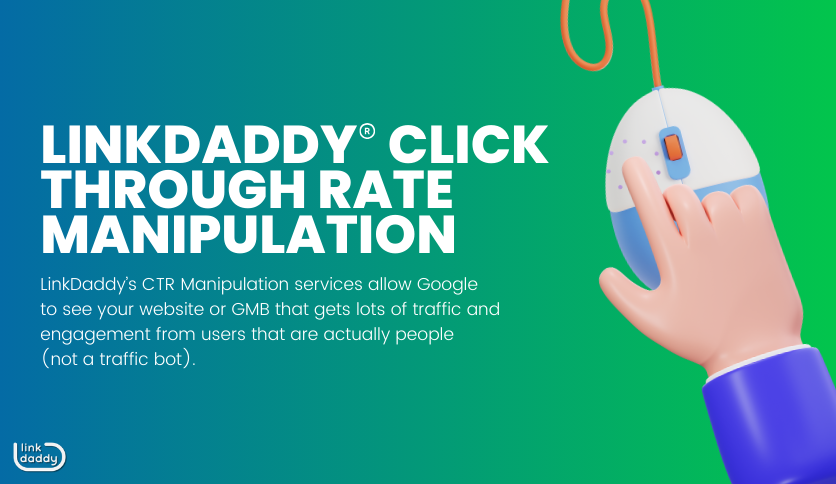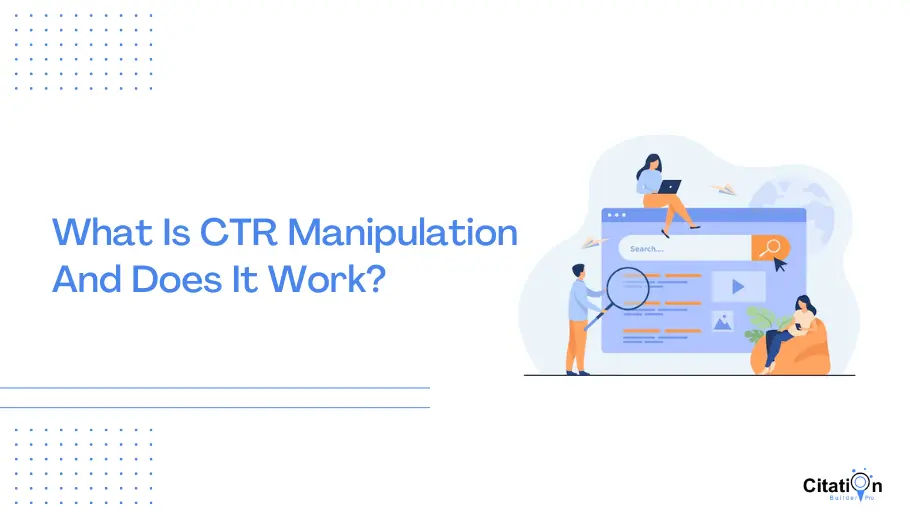LinkDaddy CTR Manipulation: What You Required to Know for Better Outcomes
LinkDaddy CTR Manipulation: What You Required to Know for Better Outcomes
Blog Article
Elevate Your Organic Browse Positions With CTR Manipulation
The relationship between click-through price (CTR) and organic search rankings is increasingly significant in today's electronic landscape. By purposefully manipulating CTR via optimized title tags and engaging meta descriptions, services can enhance their visibility and draw in more users.
Understanding CTR and Its Importance
Recognizing Click-Through Rate (CTR) is important for any individual wanting to boost their organic search positions. CTR is the statistics that measures the percent of individuals that click on an online search engine result compared to the overall number of users who watched that result. A higher CTR shows that a web page is relevant and enticing to users, which can lead to improved visibility in search engine results web pages (SERPs)

To profit from CTR, it is vital to continuously examine and optimize your material approaches. Methods such as A/B screening for headlines and meta summaries, together with recognizing user habits, can significantly affect your CTR. Inevitably, improving CTR is a critical approach to driving natural website traffic and improving total search exposure.
Just How Online Search Engine Use CTR
Internet search engine utilize Click-Through Rate (CTR) as a significant consider assessing the importance and high quality of search engine result. CTR is the proportion of users who click on a search engine result to the complete number of users who see the search results page web page. A higher CTR indicates that users find a particular link engaging and relevant, signaling to search engines that the content is important and worth promoting.
Online search engine constantly evaluate CTR data to refine their algorithms and improve user experience. When a particular result regularly attracts clicks, it may be awarded with greater rankings, as this behavior recommends that the web content properly fulfills customer intent. On the other hand, reduced CTR for a result can indicate an absence of relevance, triggering online search engine to decrease its position.
Furthermore, CTR can vary based on elements such as the kind of web content presented, the placement of the web link, and the nature of the inquiry. Understanding these dynamics enables online search engine to customize outcomes more efficiently, improving the possibility that users will certainly discover what they are searching for. Inevitably, CTR offers as a crucial metric that educates online search engine about customer preferences, guiding them in supplying one of the most significant outcomes.
Methods for Efficient CTR Manipulation
Often using specific techniques can dramatically boost Click-Through Fees (CTR) for organic search results page. One efficient strategy is to optimize title tags and meta summaries. Crafting engaging, clear, and concise titles that incorporate key key phrases can bring in user interest, while persuasive meta summaries can offer a succinct summary of the web content, enticing clicks.
One more technique involves making use of abundant fragments, which boost search listings with extra aesthetic elements such as rankings, pictures, or product accessibility. These features can identify your listing from competitors, triggering raised engagement.
In addition, leveraging emotional triggers in your web content can motivate customers to click. Phrasing that evokes interest, necessity, or exclusivity often leads to greater CTRs. As an example, titles that pose appealing inquiries or offer remedies to typical problems can be especially reliable.
Finally, think about A/B screening numerous headlines and summaries to recognize which mixes yield the greatest CTR. This data-driven approach enables for continual refinement of your techniques, eventually boosting your natural search efficiency. By applying these strategies, you can create a more enticing and engaging presence in search engine result, therefore improving your total CTR.
Determining Your CTR Impact
Examining the influence of your CTR adjustment efforts is essential for enhancing organic search efficiency. To effectively gauge this impact, start by making use of analytics tools that track organic search traffic and individual interaction metrics. Google Look Console CTR Manipulation Press Release is an important resource, supplying insights right into click-through prices for certain keywords and pages, allowing you to identify which strategies produce the most effective outcomes.
It's vital to develop a baseline CTR before implementing any adjustment methods. This allows you to compare efficiency in time and analyze the efficiency of your efforts. Tracking modifications in natural website traffic, bounce rates, and conversion prices along with CTR data will certainly give a detailed understanding of user actions resulting from your approaches.
A/B screening can likewise be advantageous; by producing variations of meta titles and summaries, you can measure which combinations cause higher CTRs. Documenting these metrics over time will certainly assist in trend evaluation, permitting you to refine your strategy continually. Eventually, a methodical analysis of CTR effect will equip you to make data-driven choices, making sure that your organic search positions are regularly elevated and lined up with your total digital marketing objectives.
Moral Considerations in CTR Techniques
When carrying out CTR adjustment strategies, it is important to consider the moral effects of such practices. While improving click-through rates is a reputable goal for enhancing organic search rankings, the approaches employed need to line up with moral criteria. Deceptive individuals via deceitful methods, such as clickbait titles that do not supply on their promises, can erode trust fund and damage brand track record.
Moreover, taking part in techniques that unnaturally pump up CTR, such as making use of crawlers or incentivizing clicks, raises concerns concerning the integrity of the information existing to online search engine. Online search engine prioritize genuine customer engagement, and controling CTR can result in charges, resulting in decreased exposure and reputation.
Openness and sincerity must be at the center of any CTR strategy. Marketers must intend to offer worth through pertinent and high quality web content that satisfies user assumptions. An ethical method not just cultivates a favorable partnership with the target market however also contributes to sustainable long-term development in organic search performance. Inevitably, stabilizing effective CTR techniques with honest considerations is important for preserving both brand name stability and customer trust fund in a progressively competitive electronic landscape.
Final Thought
To conclude, properly controling click-through rates (CTR) works as a crucial method for enhancing organic search positions. By maximizing title tags and meta summaries, using abundant bits, and interesting users emotionally, websites can substantially improve their presence in search engine result. Additionally, continuous dimension and A/B testing are necessary to fine-tune these approaches. Keeping moral requirements ensures transparency and user trust, promoting long-lasting development and reliability in the competitive electronic landscape.
CTR is the metric that gauges the percent of users who click on a search engine result contrasted to the complete number of users that viewed that outcome. A greater CTR suggests that a web page is relevant and enticing to users, which can lead to enhanced presence in search engine results pages (SERPs)

Report this page